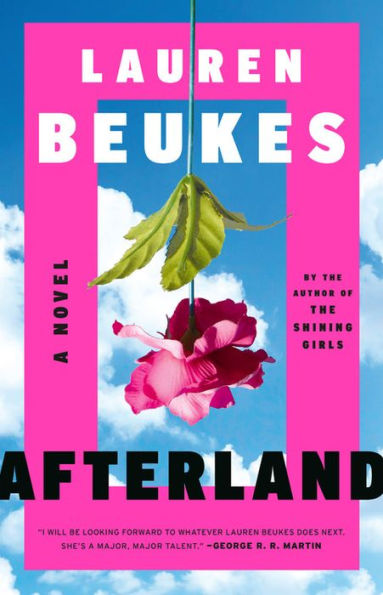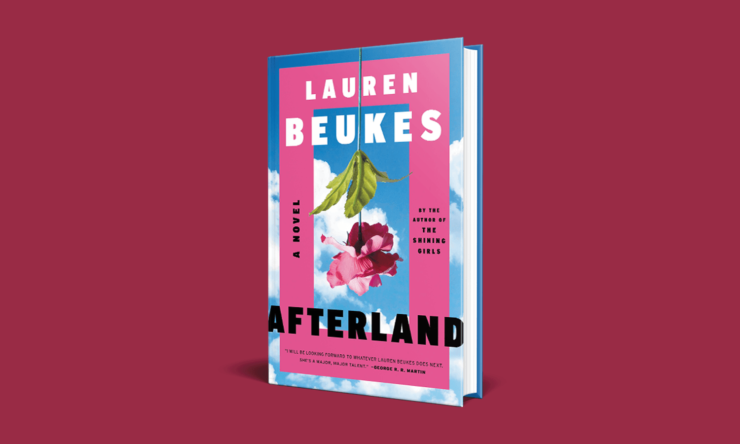The Human Culgoa Virus starts off as a highly contagious flu, but soon causes aggressive prostate cancer and kills off 99% of people with prostate glands around the world. The remaining seem to be genetically immune, though no one knows how or why. But generally, it’s game over for the majority of the people with a Y chromosome in Lauren’s Beukes’ latest novel, Afterland.
Women may be in charge, but their bodies are still governed by the state: they aren’t allowed to get pregnant, or have babies (if by some illegal way they can find viable sperm). A worldwide treaty has been put in place against all pregnancies, until HCV can be cured, or managed in some way.
Cole is far from home in California, after what was meant to be a family vacation ends with her husband dead, and her son one of the very rare male survivors of the pandemic. She and Miles are taken away to a military facility for their own safety, except safety in the new post-HCV world looks a lot like a fancy prison.
A few years of being held in Ataraxia and given limited time with her son, Cole is frustrated, and ready to break out and away, no matter what it takes. While Miles is no longer being tested on (with only a tiny sample group, there’s not much to be learnt it seems), but Cole herself is pumped full of hormones so her eggs can be harvested. Neither mother nor son has any agency over their bodies, though of course it is Miles who is the vital one – the ‘menfolk’ are heavily guarded all over the world, and rarely left to live their own lives without state supervision.
Buy the Book


Afterland
Cole wants to go home, she wants Miles to have some sense of normalcy, instead of growing up constantly watched, examined, locked up for an uncertain future. ‘The geography of home,’ she knows, ‘is accidental: where you’re born, where you grow up, the tugs and hooks of what you know and what shaped you. Home is pure chance. But it can also be a choice’. And for Cole and Miles that choice had been South Africa. So when Cole’s sister Billie arrives suddenly at Ataraxia, the sisters plan to somehow smuggle Miles away. Except Billie has other ideas: ones that include getting rich quick by selling her nephew’s sperm on the black market. One sudden, violent altercation between the sisters is all it takes for Cole to be on the run across the US – both from Billie and the crime lord she’s managed to get involved with, as well as the military – holding desperately onto a hope that she can get Miles home, even as she admits that the ‘idea is ridiculous. Thousands of miles, whole oceans and now multiple felonies between them and ever seeing Johannesburg again. But Cole is desperate, determined, and driven entirely by her love for her son.
As the two traverse the United States with Miles disguised as ‘Mila’, they meet anarchist groups, matriarchal communes and a group of nuns called the Church of Sorrows. They’re also just a few steps ahead of Billie, who is accompanied by a couple of very violent women who will do anything to get at Miles.
Why assume that a world run by women will be utopic? In Beukes’s vision, capitalist structures remain, as do hierarchies in society, economy, and crime. Power is power, and those with it may abuse it, no matter what their gender. High demand items will always find a way to be traded – illegally, if need be. Where once young women’s bodies were commodified, in Afterland, we see the same of young men. Women, says Beukes, are no less lethal or hungry or violent to get what they want than men are, when they need to be. Sure, some things are better – there are some matriarchal communes that seem to work successfully, for example, but there are also anarchist groups and religious extremists. Why wouldn’t there be?
Two of Beukes’ earlier novels, Zoo City and The Shining Girls, both had speculative elements. Her last book, Broken Monsters, was a more straight-forward crime thriller where the potential fantastical element of bodies being joined together was very much a brutal and physical reality. Afterland, like Broken Monsters, stays in the real world—except of course, without most of the men. Recognisable systems are still in place – this isn’t the apocalypse, it’s simply a pause in the order of things we have known; a reassessment of what went wrong, and an attempt to keep our most vulnerable safe (does that sound familiar?). The end of the world doesn’t always come with a bang, but sometimes with a slow grinding halt of the machine.
The narrative perspectives alternate between Cole, Miles, and Billie, helping to make the novel’s plot propulsive and deceptively simple, albeit stressful and frightening, made much more complicated by Miles’ own burgeoning puberty and all the complicated emotions that come alongside. Ultimately, this is a story about a single mother and her child trying to find a safe space in which to just be. A space in which they can develop their relationship, as Miles grows and finds out who is he, other than a survivor of a global pandemic, other than a bearer of sperm. It is sweet and poignant, but also fierce: what else do we expect from a mother’s love?
Afterland is a perfect example of when speculative fiction is so fiercely intelligent and logical that it is prescient – call it life imitating art if you will—the book was written before the current Covid-19 pandemic—but there are just too too many uncanny coincidences in both the main narrative, and the mise en scene for one not to admire Beukes’ ability to predict a future that so much of is now reality. “You can’t imagine how much the world can change in six months”, says Cole—except now we can, we absolutely can. “Can it have been that long since the end of the world? Time dilates and blurs”—yes, it does.
Writers all over the world may be scrabbling to get the next big pandemic book written this year, but Beukes is ahead of her time. And it’s no surprise at all.
Afterland is available from Mulholland Books.
Read an excerpt here.
Mahvesh loves dystopian fiction and appropriately lives in Karachi, Pakistan. She writes about stories and interviews writers for the Tor.com podcast Midnight in Karachi when not wasting much too much time on Twitter.










